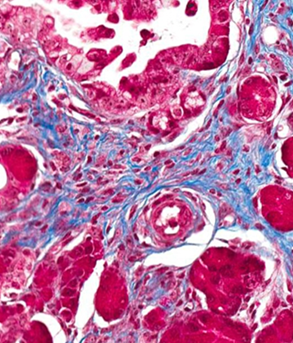- De novo genetic murine model is engineered to spontaneously develop pancreatic cancer.
- Cancerous lesions exhibit a range of stages, from PanIN grades to undifferentiated ductal adenocarcinoma.
- Carcinogenesis in KPC model is driven by a combination of activated Kras and mutant p53(R172H) pathways, selectively perturbed in pancreatic tissue.
- Experimental tumors match histopathologic and molecular features characteristic of human pancreatic cancer.
- Carcinogenesis timeline is compatible with scalable preclinical experimentation (latency of tumor formation ~20-25 weeks, with up to 25% of tumors meeting enrollment criteria for drug efficacy evaluation).
- Nascent tumors are dependably detected by palpation and abdominal ultrasound.
- Tumor dynamics and drug response are followed by ultrasound imaging and biomarker assessment.
- An extensive collection of tumor biopsy and serum samples from diseased and tumor-free genetically matching control animals is available for biomarker analysis in transformed tissue and circulation.
